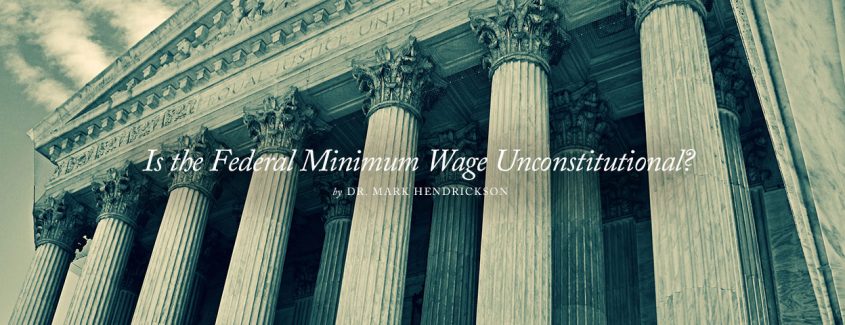
Editor’s note: This article first appeared at TheBlaze.com.
It’s a familiar political scenario: Behind the fig leaf of compassion and fairness, progressives and the union-dominated Democratic Party want the federal government to raise the minimum wage.
Democratic presidential candidate Hillary Clinton favors a $12 per hour federal minimum wage, while her competitor, Senator Bernie Sanders, one-ups her: He favors raising the federal minimum to $15 per hour. The economic folly of the living wage/minimum wage nonsense is as plain as day to anyone with eyes to see.
Now for some good news: While reason and persuasion aren’t going to deter progressives from pursuing their ideological quest, it is now quite possible that our judicial system will. According to the Supreme Court, minimum wage laws may now be unconstitutional. Specifically, such laws run afoul the “disparate impact” principle set forth in last June’s Supreme Court decision in Texas Department of Housing v. Inclusive Communities Project.
First, a little history:
Raising the federal minimum wage has had a disproportionately disparate—adversely disparate, in fact—impact on African American male teens for over half a century. The underlying economics is elementary: When a price is set above the market-clearing price, a surplus—in this case, of those seeking work—is created, so buyers can cherry-pick whom to hire. Most employers are white, and whether they select white kids for whatever reason, the bottom line is that young whites have been hired at a higher rate than young African Americans.
In his path-breaking 1982 book, “The State Against Blacks,” economist Walter E. Williams published Bureau of Labor statistics showing the emergence of a racially disparate impact of the minimum wage from the 1950s through 1980. During the ‘50s and ‘60s, the ratio trended inexorably upward until, from 1972 to 1980, the ratio was always greater than two-to-one—that is there were more than twice as many unemployed African American teens.
In the decades since Williams’ book first appeared, the minimum wage has continued to keep young African Americans unemployed at close to twice the rate as whites. For example, in September 2009, in the first two months after the current $7.25 federal minimum wage went into effect, the unemployment rate for male African American teens rose from 39.2 percent to 50.4 percent, compared to the overall teen unemployment rate rising from 23.8 percent to 25.9 percent. In June of 2012, the unemployment rate for African American teens was 39.3 percent compared to 20.9 percent for whites of the same age. In January 2015, the unemployment rate for African American teens was 29.7 percent versus 16.4 percent for white teens.
Enter, the Supreme Court’s Texas Housing decision. In this decision, the court strengthened the 1964 Civil Rights Act’s Title VII, which defines as discriminatory and illegal any policy or practice that has a disproportionately adverse impact on a “protected class,” such as African Americans. Further strengthening Title VII, Justice Anthony Kennedy’s majority opinion states that Congress intended the Civil Rights Act to “proscribe … practices that are fair in form, but discriminatory in operation,” and he explicitly stipulated that one of the intents of the Civil Rights Act was to achieve “equality of employment opportunities.”
4 minute video: “Peyton Manning’s Stem Cell Therapy”
Kennedy went on to write, “Disparate-impact liability mandates the ‘removal of artificial, arbitrary, and unnecessary barriers,’ not the displacement of valid government policies.” If you stop to ponder what that sentence means, you will see that it is highly problematical, for nowhere in Kennedy’s opinion are there any “bright line” criteria for determining what constitutes a “valid” policy. However, it is difficult to think of a more “arbitrary” policy than Congress picking a number that sets an “artificial” limit on the pay that two willing Americans (employer and employee) may freely legally contract for—limits that are not only completely “unnecessary” but, in practice, highly discriminatory.
There is a certain exquisite irony in a flawed, idealistic decision like Texas Housing undermining the constitutional viability of the federal minimum wage law. In their attempt to construct a “Great Society” or “Brave New World,” would-be social engineers inevitably make a mess of things. The left hand doesn’t know what the right hand is doing.
For example, one New Deal program was to build a government-planned rural community named Aksarben (that’s “Nebraska” spelled backward) from scratch. It never worked, not least because the government-ordered prefabricated houses didn’t fit the government-ordered foundations. Similarly today, the glaring incompatibility of the minimum wage law and the Texas Housing ruling shows the absurdity of top-down government planning. The progressives want to have their cake and eat it, too, with progressives in Congress wanting to mandate higher wages while progressives in the Supreme Court ruling against laws that produce discriminatory results.
The minimum wage law has violated freedom of contract and victimized young African Americans unfairly for far too long. Armed with the Supreme Court’s Texas Housing ruling, let’s hope some talented legal eagles mount a lethal challenge to the federal minimum wage law ASAP. If an imperfect Supreme Court decision marred by vague language is the best tool available to liberate African American youths from the patent injustice of progressives’ minimum wages laws, then let us hope that it is so employed.


